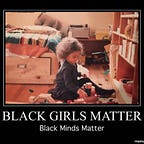Oops, you did racism a favor
A few weeks ago, an email with racist language targeting Native Hawaiians in it was widely circulated by two very prominent members of the astronomy community. After public and private outcry, they both offered apologies of sorts, although in neither case was the apology to the people who were the victims of the offensive language.
Several of us came together to write a statement about the use of offensive and racist language in sociopolitical discourse within the astronomy community, with the hope that our professional society, the American Astronomical Society (AAS) would endorse and publish the statement as a message to all members, racial minorities especially, that AAS was against racism.
Some 50+ emails later, the President of AAS Meg Urry published a letter about the incident. The letter had some strengths. It had some weaknesses. Its most significant weakness was essentially suggesting that making general statements about “senior white astronomers” was equally harmful as racism toward minorities.
!!!!!!!
I pointed out the problems on Twitter and soon after many white women in the astro community joined me, tweeting at Meg directly, discussing it with her on a phone call and discussing on Facebook that this was a problem. Eventually, Meg altered the letter while publicly complaining on Twitter about the strong reaction people had to this problem.
Here’s the thing. Meg and others seemed to think we were nitpicking for theoretical reasons and overblowing the whole thing. But in fact, less than 48 hours later, a prominent astronomer wrote a statement (that is not publicly available) in response to the dialogue about Meg’s letter that many took as an attack on me (which is why I feel entitled to write about this private statement), another Black scientist, a Latina scientist and several of our white allies. In it this astronomer proclaimed that racism against white people is a problem and suggested that some people of color and their allies in the community had created a hostile environment for white people. This statement came as an empowered follow-up to Meg’s words and the words of other white leaders in the community who defended her, as if saying that she made a mistake was an attack on her entire existence.
In other words, Meg’s mistake (and the defenses which compounded it) had real consequences. Although it was unintentional, Meg’s letter had given energy to the concept that white people can be victims of racism.
So, even when you don’t mean to, you can be doing racism a favor. And when people call you out on your mistakes and ask you to fix them, they are often doing it because they know that these consequences are coming. People who have taken their time to learn about and respect minority experiences know that we have to deal all the time with comments like, “you are a reverse racist” and “you are engaging in anti-white racism.”
When the leader of a national organization says something that at best ambiguously sounds like it might mean that anti-white racism exists, or suggests that white people with seniority, tenure, and even equations named after them are suffering the way Native American and Hawaiian undergraduates are suffering, that leader has provided problematic leadership that harms people in their community.
We all make mistakes. Part of genuinely taking responsibility for them is to understand and own the consequences.
And speaking of consequences, here are some: when a POC calls a white person’s actions racist, the white person might feel bad and also people might look at them negatively. When a white person encourages and/or directly participates in racism, they are contributing to a large set of social structures that are not only psychologically dangerous for POC but also physically dangerous, especially for those of us who are Black, Native and Latin@.
Honestly, if I had to pick between being called a racist and the genuine fear I feel when I walk by police, I’d pick being called a racist. In that scenario, there’s no chance I will die, which is excellent.
p.s. Notably, the American Astronomical Society as an organization never got behind an anti-racism statement. By contrast, within days of the incident, Sarah Tuttle and I wrote a statement that has since garnered around 230 co-signers.
